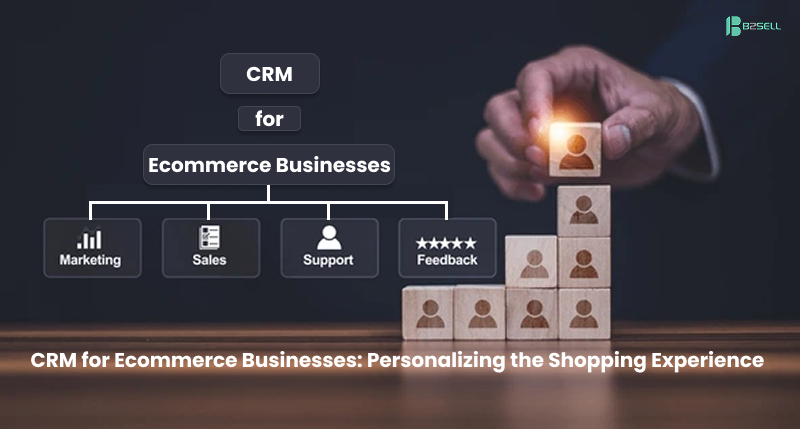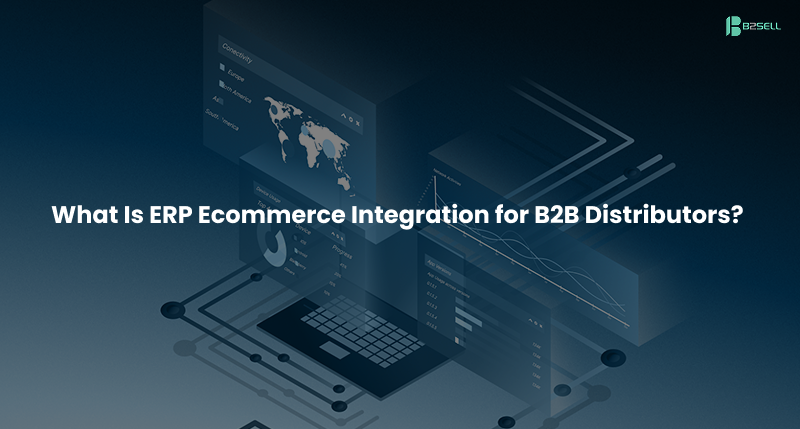In today’s fast-paced digital commerce environment, customer experience is no longer a differentiator — it’s a necessity. Ecommerce businesses that understand their customers deeply and personalize interactions effectively are the ones leading the market. This is where CRM for ecommerce comes into play. A powerful CRM system helps businesses bridge the gap between data and relationships, ensuring every touchpoint — from browsing to post-purchase — feels personalized, intelligent, and customer-focused.
For B2B distributors, wholesalers, and manufacturers managing complex customer journeys, integrating CRM with ecommerce platforms is not just a convenience — it’s a strategic advantage. With B2Sell’s CRM Integration solutions, businesses can automate workflows, synchronize data, and deliver tailored buying experiences that increase customer loyalty and long-term revenue growth.
What Is CRM for Ecommerce?
CRM for ecommerce refers to customer relationship management software designed to help online businesses manage interactions with customers, prospects, and partners. Unlike generic CRM tools, ecommerce CRMs integrate directly with online storefronts, ERP systems, and marketing platforms to provide a single source of truth for all customer data.
Key Functions of an Ecommerce CRM Include:
- Tracking customer behavior and purchase history.
- Automating follow-ups and marketing campaigns.
- Personalizing product recommendations.
- Streamlining order and customer service management.
- Analyzing customer lifetime value (CLV) and engagement metrics.
By aligning marketing, sales, and support efforts, CRM software for ecommerce enables businesses to deliver the right message at the right time — every time.
Why CRM Is Essential for Modern Ecommerce Businesses
Today’s B2B buyers expect the same seamless, personalized experiences that B2C customers enjoy. A CRM system for ecommerce helps businesses meet those expectations by connecting data, automating interactions, and offering actionable insights.
Here are some compelling reasons ecommerce businesses rely on CRM systems:

1. Centralized Customer Data
A CRM consolidates information from multiple touchpoints — online orders, email interactions, support tickets, and more — into a unified view. This holistic customer view helps businesses tailor their communication and marketing efforts effectively.
2. Enhanced Personalization
Personalization is at the heart of ecommerce success. With CRM tools, businesses can segment customers by industry, purchase frequency, or region to deliver targeted offers, promotions, and content.
3. Automated Workflows
Manual processes slow down growth. CRM systems automate routine tasks like sending invoices, managing follow-ups, and updating order statuses — reducing human error and improving operational efficiency.
4. Improved Customer Retention
Repeat customers drive profitability. A CRM helps track customer satisfaction, identify at-risk clients, and trigger personalized re-engagement campaigns to build loyalty.
5. Seamless Integration with Ecommerce Platforms
The best CRM for ecommerce business integrates directly with platforms like Magento, Shopify, and Epicor Prophet 21, enabling real-time data synchronization between sales, inventory, and marketing channels.
How CRM Personalization Drives Conversions and Loyalty
In the competitive B2B ecommerce landscape, personalization is the key to differentiation. By using CRM data intelligently, businesses can offer experiences that resonate with customer intent and need.

1. Tailored Product Recommendations
CRMs analyze purchasing patterns to recommend relevant products or accessories. For instance, if a distributor purchases sprayer parts frequently, the system can suggest compatible nozzles or pump kits automatically.
2. Dynamic Pricing and Discounts
With integrated CRM and ERP data, businesses can offer personalized pricing or discounts based on customer segment, order volume, or past purchase behavior.
3. Intelligent Email Campaigns
CRM-driven email automation allows for personalized product updates, re-order reminders, and loyalty program invitations — improving engagement and conversions.
4. Post-Purchase Support
CRMs record service history, enabling customer support teams to provide faster, context-aware solutions and improve the post-purchase experience.
Best CRM Software for Ecommerce Businesses
The ecommerce ecosystem offers many CRM platforms, but not all are designed for the specific needs of B2B distributors and wholesalers. Below is an overview of leading CRM solutions — and why B2Sell CRM Integration stands out as the most strategic choice for integrated ecommerce success.
1. HubSpot CRM
Best For: Small ecommerce businesses and startups
Key Highlights:
- Simple setup and easy-to-use interface
- Robust marketing automation tools
- Free version available for entry-level use
- Ideal for businesses focusing on inbound marketing and lead nurturing
While HubSpot is great for smaller operations, it lacks deep ERP connectivity and large-scale B2B integration features.
2. Salesforce Commerce Cloud
Best For: Large enterprises managing global ecommerce operations
Key Highlights:
- Extensive customization capabilities
- AI-driven analytics for customer insights
- Supports omnichannel sales and marketing integration
- Scalable architecture suitable for complex workflows
Salesforce is powerful but often costly and requires significant customization — making it less practical for mid-sized B2B distributors or wholesalers.
3. Zoho CRM
Best For: Growing ecommerce firms and SMBs
Key Highlights:
- Affordable subscription plans
- Automation-driven lead and contact management
- Integration with popular ecommerce tools and apps
- User-friendly and accessible for scaling teams
Zoho offers great value, but it’s primarily focused on general ecommerce, not the specialized needs of B2B environments with ERP systems or contract-based pricing.
⭐ 4. B2Sell CRM Integration — The Best CRM Solution for B2B Ecommerce
Best For: B2B distributors, wholesalers, and manufacturers seeking seamless ERP and ecommerce connectivity
Key Highlights:
- Built for ERP Integration: Fully compatible with Epicor Prophet 21 (P21) and other leading ERP systems — enabling real-time data synchronization across orders, inventory, and customer records.
- Personalized B2B Portals: Create customer-specific catalogs, pricing tiers, and contract-based product views to deliver an unmatched personalized shopping experience.
- Automation and Efficiency: Streamline workflows across sales, customer service, and fulfillment — minimizing manual data entry and human errors.
- Data-Driven Insights: Access real-time analytics and performance dashboards that help identify opportunities, improve retention, and boost conversion rates.
- Scalable and Secure: Designed for high-volume B2B transactions with enterprise-level data protection and performance.
- Seamless Integration with B2Sell Ecommerce Platform: When paired with B2Sell’s B2B ecommerce solutions, the CRM becomes a unified engine for customer engagement, personalization, and growth.
Unlike general-purpose CRMs, B2Sell CRM Integration is purpose-built for B2B commerce — bridging the gap between your ecommerce store, ERP, and customer data. It empowers distributors and wholesalers to not only manage customer relationships but also personalize every interaction, automate sales cycles, and deliver data-backed service excellence.
Benefits of Integrating CRM with Ecommerce Platforms
When CRM is tightly integrated with ecommerce systems, businesses experience improved efficiency and deeper customer insights. Here’s how:

1. Unified Customer Experience
Integration ensures that sales, marketing, and support teams have access to the same real-time data. This unified approach enhances communication and consistency across departments.
2. Smarter Sales Insights
Integrated CRMs offer analytics dashboards that track sales trends, high-value customers, and order history, enabling better forecasting and strategic planning.
3. Improved Order Accuracy
By syncing ecommerce and CRM data, order processing becomes seamless — reducing manual entry errors and ensuring faster fulfillment.
4. Marketing Optimization
Marketers can leverage CRM data to segment audiences and create targeted campaigns based on buying behavior, demographics, and purchase history.
Top Features of the Best CRM for Ecommerce
When selecting the best CRM for ecommerce, look for features that improve automation, integration, and personalization capabilities.

- Customer Segmentation – Group customers based on behavior, geography, or sales potential.
- Automated Lead Nurturing – Send targeted follow-ups and abandoned cart reminders.
- Sales Pipeline Tracking – Manage and visualize leads from first contact to purchase.
- Multichannel Integration – Connect email, SMS, social media, and ecommerce platforms.
- AI Analytics – Gain predictive insights on buying trends and customer churn.
- Mobile Accessibility – Empower your sales teams with CRM data on the go.
B2Sell CRM Integration: Powering B2B Ecommerce Success
B2Sell specializes in helping distributors, wholesalers, and manufacturers streamline their ecommerce operations through advanced CRM and ERP integrations.
Key Highlights of B2Sell’s CRM Integration Solutions:

- Seamless ERP Integration: Connect your ecommerce storefront with Epicor Prophet 21, Magento, NetSuite, or other ERP systems for real-time synchronization.
- Centralized Data Access: Maintain customer, pricing, and order data in one unified dashboard.
- Automated Order Management: Eliminate manual entries and speed up processing.
- Personalized B2B Portals: Offer customer-specific catalogs, pricing tiers, and discounts.
- Enhanced Analytics: Track customer behavior, measure KPIs, and make informed decisions.
B2Sell’s integration framework ensures that businesses can manage complex B2B workflows efficiently while enhancing the overall customer experience.
How CRM Integration with B2Sell Improves the Ecommerce Experience

1. Real-Time Data Sync
Customer details, order updates, and inventory changes are automatically reflected across platforms, ensuring accurate information at every stage.
2. Personalized Customer Portals
B2Sell enables businesses to design customer portals that display contract-based pricing, personalized product recommendations, and order history — creating a more relevant shopping experience.
3. Automated Marketing and Follow-Ups
Integrated CRM tools trigger personalized marketing messages and reminders based on customer activity, improving re-engagement, and sales opportunities.
4. Insightful Analytics
Gain visibility into customer behavior and preferences with real-time dashboards, helping businesses anticipate needs and optimize product offerings.
FAQs
What is the best CRM for ecommerce businesses?
The best CRM for ecommerce depends on business size and integration requirements. For B2B distributors and wholesalers, B2Sell’s CRM Integration offers the perfect balance of personalization, automation, and ERP connectivity.
How does CRM improve ecommerce personalization?
CRM tools gather customer data such as purchase history, preferences, and interactions, enabling businesses to tailor offers, pricing, and product recommendations effectively.
Can small ecommerce businesses benefit from CRM integration?
Yes. Even small ecommerce businesses gain a competitive edge by using CRM for eCommerce to automate marketing, manage leads, and strengthen customer relationships.
Is B2Sell CRM integration compatible with Prophet 21 and Magento?
Absolutely. B2Sell seamlessly integrates with Epicor Prophet 21, Magento, and other leading ecommerce and ERP systems, offering real-time data sync and advanced customer personalization.
Final Thoughts: Elevate Customer Experience with B2Sell’s CRM Integration
In the modern B2B ecommerce landscape, personalization isn’t optional — it’s expected. A well-implemented CRM for ecommerce strategy empowers businesses to deliver targeted experiences, automate processes, and build lasting customer relationships.
By partnering with B2Sell, distributors and wholesalers can integrate CRM and ecommerce systems to unlock powerful insights, streamline sales processes, and deliver personalized B2B shopping experiences that drive growth.
Ready to Transform Your Ecommerce Experience?
Discover how B2Sell’s CRM Integration Solutions can help your business centralize data, personalize experiences, and accelerate growth.
👉 Visit B2Sell CRM Integration to learn more about how we help businesses streamline their B2B ecommerce operations with smarter, data-driven customer engagement.


.png)




.png)